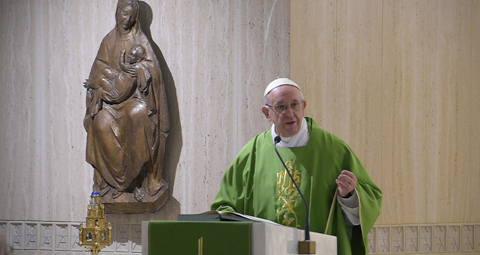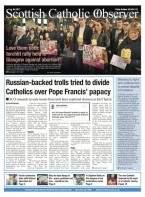October 26 | ![]() 0 COMMENTS
0 COMMENTS ![]() print
print

Channeling Christ is the key to a good homily
Since his ordination, Fr McMorrin cringes when thinking about his previous ‘post-Mass analysis’ of preaching — By FR JAMIE MCMORRIN
Before I became a priest, I had a fairly clear idea about what a homily should be like. I expected a homily that was well-researched but also original; intelligent but also accessible, a proclamation of the eternal truths of the Gospel that was also relevant to our own times.
It should be moving, but not trite; personal but not self-referential; learned but not boring.
Of course, it should give an in-depth exegesis of all of the readings, tie them together and relate them to the present situation of the Church and the world.
It would be nice if there were a joke, a story and a memorable image or two.
It should give me some relevant advice about putting the key message into practice in my every-day life.
And it absolutely couldn’t go on for more than five or six minutes. Ideally, I wanted a sermon like this every day, but I’d be willing to settle for once a week. Hardly a lot to ask!
I must say that, since ordination, I’ve rather lowered my expectations. I’ve also become a much more sympathetic listener to the preaching of others. I cringe when I think of the scathing reviews I dished out to priests having a bad day, and I’m glad that I don’t usually hear the ‘post-Mass analysis’ of my own often lacklustre efforts.
Don’t get me wrong, I absolutely agree with Pope Francis when he reminds priests, in his usual frank style, that God’s faithful people expect and deserve good preaching. But it’s much harder than I ever thought!
The homily is, as we know, part of the Liturgy of the Word. The instructions which accompany the Missal remind us that, ‘when the Sacred Scriptures are read in the Church, God himself speaks to his people, and Christ, present in his word, proclaims the Gospel.’
I therefore know when I sit at my desk to write a homily and when I stand at the lectern to preach, that God desires to speak to his people gathered in church and, in the Scriptures proclaimed, has in fact already spoken. My task is, then, not to so much to dazzle the congregation with my own creative brilliance, but to get out of the way and let God speak.
The first task of preaching, then, must be to listen. To listen to the voice of God speaking in the inspired Scriptures and to listen to him speaking in personal prayer.
Many Saturday afternoons I’ve sat at my desk, panic increasing in my stomach as the Vigil Mass draws ever closer, a blank sheet of paper in front of me and discarded commentaries all around me, and turning, almost as a last resort, to prayer. Saying to God, ‘I’ve got nothing to say to your people today. But I know that you do! So tell me what it is, and I’ll say it!’
Sometimes these last minute, out-of-nowhere, desperation-inspired homilies have been the ones that get the most positive feedback, while the ones with which I was secretly rather pleased pass without comment.
Preaching at its best should, I think, lead to an encounter with Jesus. The preacher’s words should point, not to himself, but to Him. It should, like that homily Jesus himself preached on the road to Emmaus, find Him hidden in all the parts of the inspired Word, and prepare us to recognise Him at the breaking of the bread which will follow in a few minutes.
As Pope Francis reminds us, it should, at its heart, be a proclamation of the kerygma, the original, central truth of the Christian Faith that changed the course of history: that Jesus died on the Cross for love of us and that he rose from the dead to open up the way to abundant life. That He is real, that He is alive and that He is at work in our world. This is what makes funerals and weddings and school Masses such a tremendous opportunity, when many people are hearing this wonderful Good News of God’s love for the first time.
The proclamation of the Good News of Jesus: this is the task. On the day of my ordination as a deacon, the archbishop handed over to me the book of the Gospels with the words, ‘Receive the Gospel of Christ, whose herald you now are: believe what you read, teach what you believe, and practice what you teach.’
The Church, in her wisdom, says it all in these few, brief words. We spend the rest of our lives trying to get the hang of it.
So, pray for us. Encourage us. Be patient with us when our homilies don’t live up to your expectations or, perhaps, our own. And listen for the voice of Christ, who was once humble enough to ride into Jerusalem on a donkey, and who is still humble enough today to speak to His people through even the most unworthy of human instruments.











